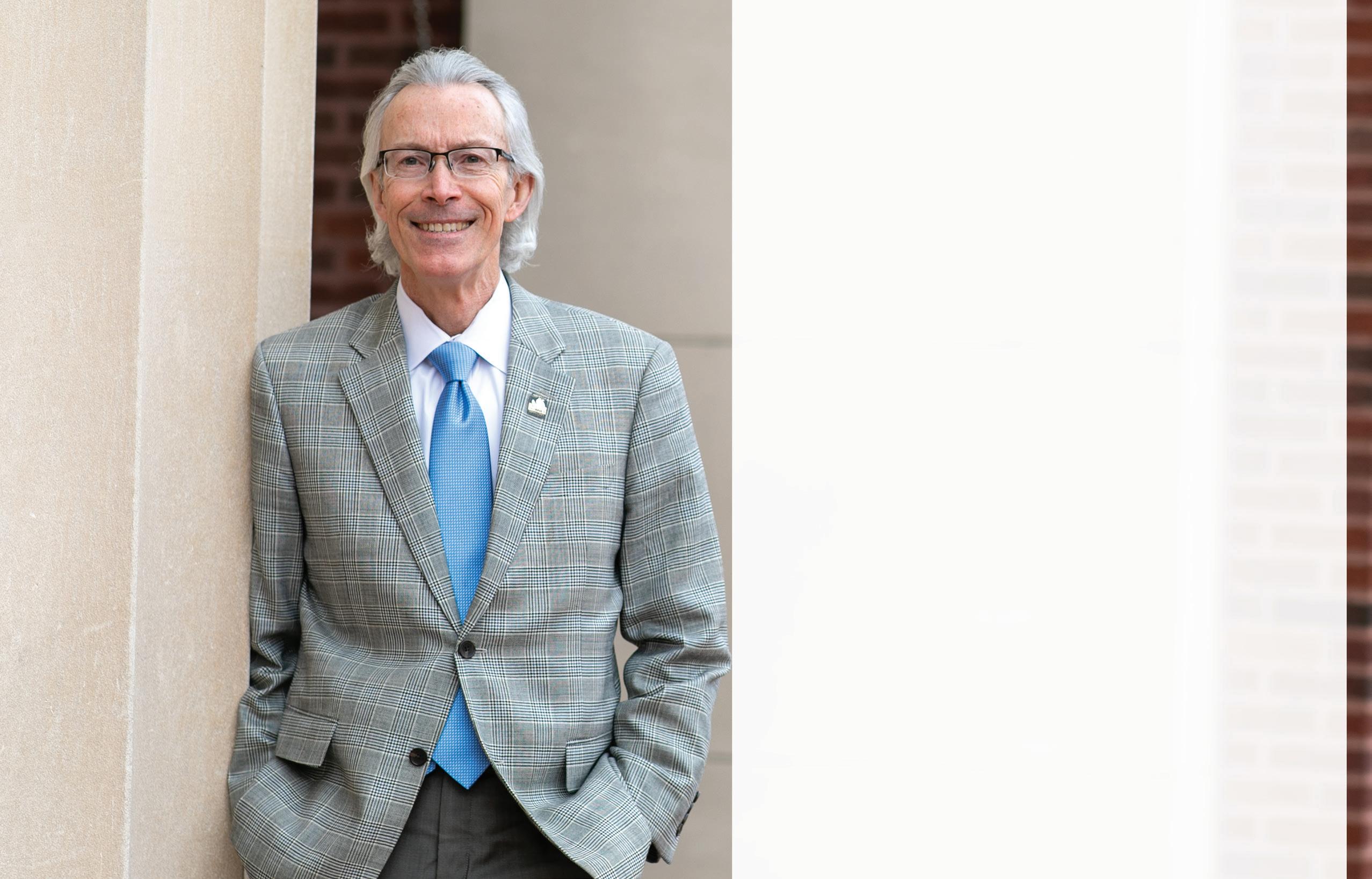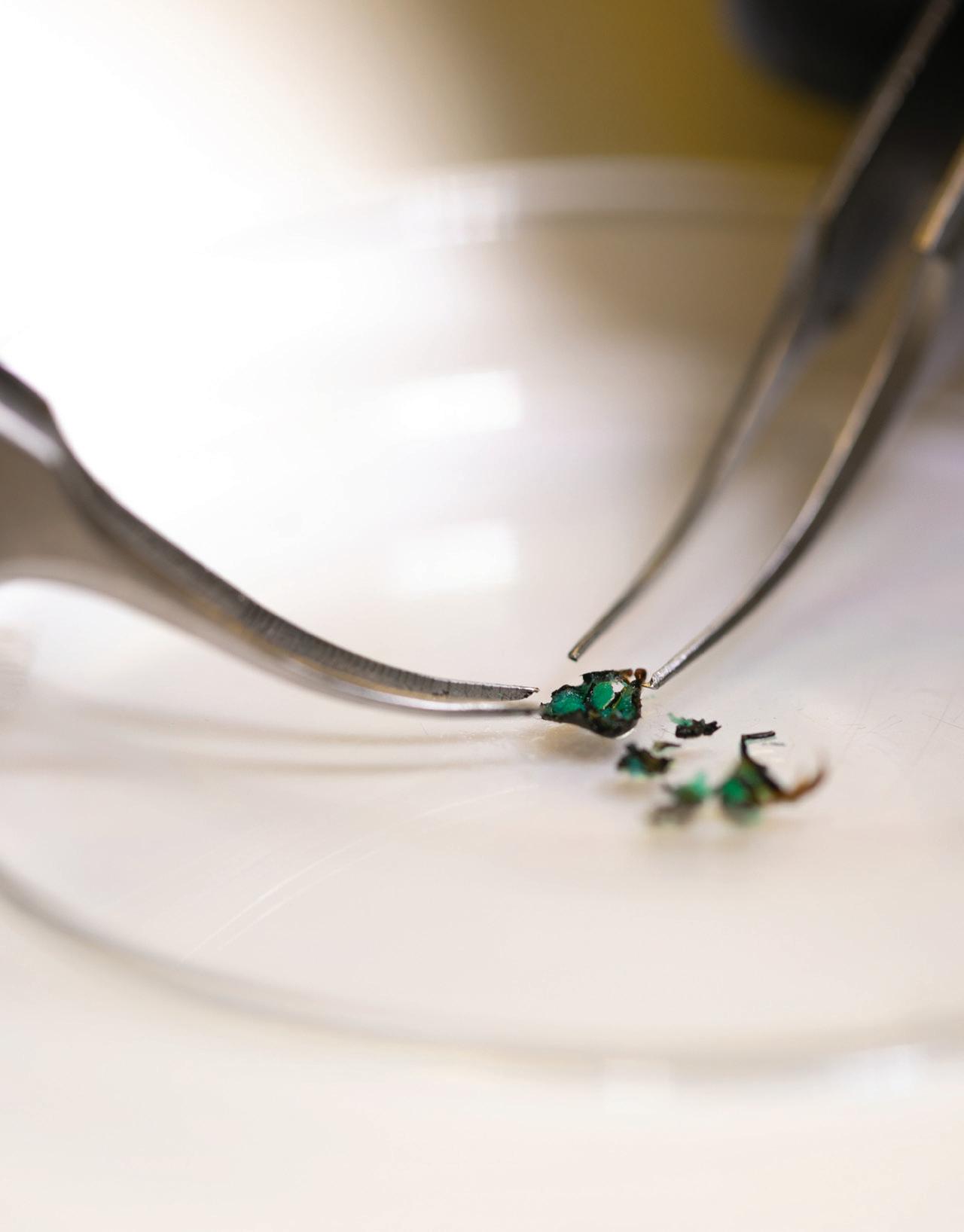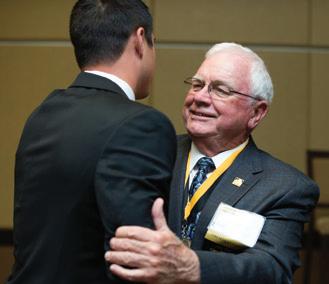
11 minute read
Abigail Morse Hall Goes Back to Its Roots
Bringing People Together
As he prepares to retire, Provost David Cordle looks back on his time at Emporia State
When Dr. David Cordle leaves his office in Plumb Hall for the last time in June, he will conclude a career in higher education that spans four decades. If you count his years as a student, he has spent five decades on college and university campuses. During that time, Cordle, ESU provost and vice president for academic affairs, has seen the evolution of higher education in the United States.
“Just to illustrate how much has changed, the technology I used in my first faculty office was an IBM Selectric typewriter, and in the classroom, it was an overhead projector!” said Cordle, who noted the many positive changes brought by technology, including reaching out to and enrolling students who might not have had opportunities in postsecondary education. “Another big change is the attitude of higher education about who we serve, and for what purpose,” he explained. “When I started, most colleges and universities didn’t worry too much about diversity and inclusion, or who had access to higher education. If I’m honest about it, we didn’t even accept much responsibility for our students’ success. “Today, we hold ourselves much more accountable, and that’s a good thing.” When Cordle entered Shorter College in the 1970s, he didn’t envision a career in higher ed administration. He did know, however, that he wanted a career on campus. “My dream was to be a music professor," he said. “To me, being a musician and working on a university campus seemed like a perfect combination. And fortunately, I got to be a music faculty member for a while before the administrative opportunities came along.” Cordle earned three degrees in piano performance—a bachelor’s from Shorter College (1976) and master’s (1977) and doctor of music (1984) from Florida State University. He taught in music departments at William Woods College and Virginia Commonwealth University before his first administrative appointment, chair of the VCU Department of Music from 1989 to 1998. He served as dean of College of Arts and Sciences at Longwood University from 1998 to 2005, then the same position at University of North Carolina, Wilmington until 2013, when he came to ESU as provost and vice president. As he advanced in the ranks of higher ed administration, Cordle discovered that his academic background was immensely helpful. “There’s a stereotype that most musicians and other ‘creative types’ aren’t particularly well suited for administrative work. That doesn’t hold up, in my experience,” he said. “Musicians and artists need more than talent to succeed. They need discipline, problem-solving skills and the ability to work with others. That’s pretty much what the provost’s job demands, and my musical training was a big help in developing those skills.” When asked about goals and accomplishments, Cordle is quick to say that administration does not happen in a vacuum. “Administrators don’t really accomplish much on their own,” he said. “Mostly, we try to create the conditions that make it possible for other people to accomplish things. But over time, I’ve had a role in developing strategic plans, starting new academic programs, revising general education, raising funds and hiring and mentoring other academic leaders.”
And during his seven-year tenure at Emporia State? “We’ve been able to do some things at ESU that I believe will make a long-term difference for the university and the people it serves,” he said. “We’ve set institutional priorities. We’ve established an Honors College. We’ve started new academic programs, and our Accelerated Online Program initiative has extended the reach of existing programs. Our emphasis on Open Educational Resources is saving money for students and encouraging innovation in our teaching. Our high-impact learning experiences are preparing students better for life after graduation.” “As best I can recall, none of these were my idea originally, and in some cases, I didn’t even lead the charge. But, I learned a long time ago not to worry about that. When people come together to accomplish good things, there’s plenty of credit to go around.” All of these accomplishments, he said, came from collaboration. “The best part of the provost’s job, to me, is the teamwork. In Academic Affairs, our deans and directors make up the best leadership team I’ve ever led. And at ESU, we have a tradition of cooperating across unit boundaries that’s unlike anything I’ve experienced in my four previous universities. President (Allison) Garrett sets the tone for that, and the other vice presidents are all in.”
As retirement draws ever closer, Cordle thought about what he might do when he no longer reports to an office every day. From 1978 until 2003, Cordle regularly presented piano performances. Beginning in 1984, the majority of performances were duo-piano recitals with his wife, Pam.
“We would usually play part of the program using two pianos, and part of it together at one piano,” he explained. “Each piece of music is written specifically for one format or the other, so we would aim for variety in the program. The challenges of playing at two pianos versus one are actually very different.” As he climbed the ladder in academic affairs, Cordle didn’t have enough time for the preparation needed for performances. “Performing hasn’t been a focus for quite a while,” he explained. “It’s funny, because as a young faculty member I would never have believed that administrative work could be as rewarding as teaching and playing music. But that turned out to be true, for me at least.” For now, Cordle anticipates playing piano for himself. “I’ll be happy just to do some playing for my own enjoyment! There really won’t be any excuse not to, because I’ll actually have some time for a change.” As part of the duo-piano recitals the couple would perform, they keep two grand pianos in their house situated together. Whether that continues when they move to Georgia to be closer to family is still in question, he said. “We’re in the process of figuring that out now,” he said with a smile. “This might be a test of those problem-solving skills that I mentioned earlier.”
The Cordles have also given generously to Emporia State through numerous philanthropic gifts. Recently, they became members of the Lyman B. Kellogg Society, ESU’s legacy giving society, by creating the David and Pamela Cordle Family Fund. This fund will support scholarships for undergraduate students in any discipline. Emporia State is grateful to David and Pam for being leaders, advocates and champions of Hornet Nation.

How one ESU student wants to make the world better for the bees, himself and someday for those battling neurological diseases
For Emporia State University junior Nicholas Rutherford, doing his part to change the world used to look like providing financial support to help his family through their time of need. But when his family no longer needed the support, Rutherford was presented the opportunity to change his own world for the better. After eight years of 80-hour work weeks spent traveling the world and engineering software designed to minimize packaging materials, he decided it was time to go to college and pursue his dream career—medical research.
Rutherford visited a variety of Kansas universities, but ESU had the qualities that won him over. “It really sold me—the size of the campus and the opportunities that I would get here,” he said. What he found was all he had hoped for and more. At ESU, the faculty wanted to understand his long-term goals and help him create and explore high-impact learning opportunities that would help him reach those goals. Rutherford is a molecular biology and biochemistry major with the goal of pursuing a career in neurochemistry. “I enjoy challenges, and the brain is something we don’t know as much about as we do the other organ systems,” he said. “That’s what draws me to it—that unknown aspect.” When working with Joanna Gress, assistant professor of Biological Sciences, he expressed his interest in neurochemistry. Gress encouraged him to pursue an in-depth project tailored to his interests, above and beyond his coursework. Together, they built a unique research project for him “from the ground up.” The research project was designed to measure the impact of pesticides on bees, specifically their ability to remember where they had found food, and then determine if CBD offered neuroprotective benefits to offset those impacts. “The pesticides we are using are the ones that are commercially used right now, and we wanted to see what those pesticides did to the bees’ learning process,” he said. “If they can’t learn, they don’t know the flower route, and they can’t bring food back to the hive, which is one of the reasons why hives are collapsing.” “I did survivorship trials with the bees in which I fed newly hatched bees combinations of CBD, Imidacloprid, Coumaphos and Thiamethoxam in varying amounts to see if the CBD extended the bees' lives,” he said. “I built a custom vacuum to collect forager bees from the hives to begin a process called Proboscis Extension Response (PER) training. For the PER training, I built and programmed a special training arena using scent pumps with a microcontroller to administer a scent that is used to measure the short-term and long-term memory of the bees. Then, during last semester, the bees were dissected and the mushroom bodies from their brains were extracted to do RNA (Ribonucleic Acid) sequence analysis to see the up and downregulation of the genes of the bees. I also helped do a study with the abdomens of the bees looking at the genes that regulate antioxidants in bees’ intestines.” Through his research, he hopes to create inexpensive solutions for beekeepers to manage hive health. Largely responsible for his own research and experimentation along with having hands-on work in the field, Rutherford’s experiences at ESU are invaluable. He knows these kinds of opportunities are pretty unique to Emporia State. He has friends at other universities and their involvement in research is often limited to cleaning lab equipment and doing simple tasks for their departments. They don’t have access to the holistic research opportunities he is getting. “At a larger university, that’s really out of reach (for an undergraduate student),” he said. “Here at Emporia… I get to do everything. That has really strengthened my lab skills.” Those stronger skills are the result of logging a lot of hours in the lab. It’s been a benefit to him in many other parts of his academic life, too. “One of the things we do a lot is PCR (Polymerase Chain Reaction) tests and micro pipetting. Those are really the same in all of the sciences. Instead of being in a lab class that is only once a week for a certain amount of time, I get more time in my research lab, and I get to really practice these skills. Then when I am in the traditional classroom, it’s a lot easier for me to go, ‘Alright these are my instructions, this is how I go about doing it.’ And, I tend to have more successful experiments because of it.” Even in the anatomy and physiology lab where he is the lab assistant, his lab experience has helped him be a resource to his students. “It makes it easier to help other students who have questions about how to do things. I can say, ‘I’ve done this a lot in my lab, and this is the best way I’ve found to do it.” Rutherford’s research has been financially supplemented by a K-INBRE (Kansas Idea Network of Biomedical Research Excellence) scholarship. He is also the recipient of a transfer scholarship, which was another major factor in his decision to attend ESU. The financial support, flat-rate tuition and research stipend cover Rutherford’s cost of living, allowing him to focus on being a student and lab assistant.
“The transfer scholarship here is why I even get to do this—spending the extra time on research and being a lab assistant,” he said. “If I had gone to some other university, I would have to be working a job and going to school. The transfer scholarship allows me to really be a student, and that’s immeasurable.”
Part of his growing love for being a lab assistant and teaching comes from the positive experiences he has had with his professors. Gress, as well as Melissa Bailey, professor of Biological Sciences, Allysa Hallett, instructor of Biological Sciences, and Darren Rebar, assistant professor of Biological Sciences, have all been pivotal in Rutherford’s academic career. He is amazed and humbled by their vast knowledge, passion and ability to constantly teach him something new. He feels welcomed and supported by them, as well as fully prepared for his next big decision. Upon graduating in spring of 2022, he hopes to take what he has learned at ESU and continue his education with a focus on neuropharmacology. He is currently looking into the University of Amsterdam and the University of Oslo. He plans to develop his research into investigating the neurochemistry behind diseases such as Parkinson’s and Alzheimer’s. He hopes to eventually partner with a physician to do clinical research and drug development for biochemical treatments for those diseases and others.
Rutherford finds inspiration in the unexplored frontier of neuropharmacology. “There’s a moment when you’re doing research—when you’re doing something new—where you’re the only person in the world who knows it, and that’s an amazing feeling.” Curiosity, his love for learning and a supportive team and environment are setting him on a path to change the world. Rutherford’s decision to do what he loves gives him the opportunity to help humanity fight against some of the most challenging and puzzling diseases we face. The high-impact educational experience he is receiving from Emporia State University is giving him the chance to be true to himself and chase his dreams.








